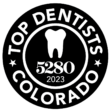Although natural teeth are intended to last a lifetime, tooth extraction may be required for various reasons. Tooth extraction is a standard dental surgery in which a tooth is removed from its socket in the bone. Although it is generally preferable to keep your teeth, there are times when they must be extracted. Patients may require a tooth extraction due to severe tooth decay, infection, or crowding. And when getting braces, one or two teeth may need to be removed to provide room for teeth to shift into place. The type of extraction required is determined by the tooth’s structure, location, and size. Surgical tooth extractions are considered to be the most common dental procedure in the United States.

Tooth Extractions
Reasons for Tooth Extraction
- Periodontal Disease – Periodontal disease damages the gum tissue and jaw bone. Bacteria may then spread and infect adjacent teeth. Tooth extraction is often recommended to restore optimum health and prevent the risk of periodontal disease and other complications.
- Infection – Because wisdom teeth are more difficult to clean, they are more likely to become infected as food and bacteria get trapped between the tooth and gums. This bacterial growth causes holes in the outer, hard enamel layer, resulting in tooth infection or cavity.
- Pain – Irritation, and pain at the site of the tooth and when you open your mouth are two of the most visible indicators that you need a dental extraction.
- Decay – Cleaning and flossing, the space between your wisdom teeth and the back of your mouth can be easy to miss. Furthermore, a partially impacted wisdom tooth is also more likely to become infected. This is because its shape and angle make degradation more likely.
- Sinus Issues – The development of teeth and tooth roots can push against the sinuses directly above and behind them and cause headaches and sinus pain due to this pressure. And you may find it difficult to open and close your mouth if your wisdom teeth are misaligned.
- Impaction – Third molars at the back of the mouth that don’t have enough room to grow or develop normally are called impacted wisdom teeth. Impacted wisdom teeth can cause severe pain, damage to nearby teeth, tooth decay, among other complications.
- Crowding – Dental overcrowding may shift the position of your teeth and undo the effects of braces.
- Cysts and Tumors – Dentigerous cysts, a fluid-filled sac that develops in the jaw bone and soft tissue, are the second most frequent type of odontogenic cyst. They develop on the top of a partially erupted or unerupted tooth, generally one of your molars or canines. Dentigerous cysts are benign but, if left untreated, they can cause gum tissue infections and bone loss.
Types of Tooth Extractions
There are two forms of tooth extractions available: simple extractions and surgical extractions. A simple extraction occurs when a tooth is visible above the gums and can be removed in one piece by a dentist. The removal of gum tissue, bone, or both in a surgical extraction is more complicated and may need to be removed in parts by a skilled oral surgeon.Wisdom teeth are the last to erupt and, in many cases, the first to necessitate oral surgery due to their impacted status. And it is one of the most frequently conducted tooth extraction procedures.
- Simple extraction – You’ll be administered a local anesthetic, which numbs the region around your teeth so that all you feel during the treatment is pressure rather than pain. Your dentist then uses an elevator to loosen the tooth before removing it with forceps.
- Surgical extraction – You’ll probably be given both local anesthetic and IV sedative, the latter of which will make you feel calm and relaxed. Depending on your health information and medical history, you may even be given general anesthesia, which will cause you to be unconscious during the surgery. Following your anesthetics, your dental surgeon will create a small incision in your gum before your tooth can be retrieved. They may need to remove bone around it or cut it in some cases.
The length of your procedure typically takes 30 to 60 minutes but will depend on the number of teeth being extracted. You can expect to be in our office 1.5 to 2 hours which accounts for consultation, procedure, and in-office recovery time.
Tooth Extractions Q & A
Your dentist will take an X-ray of your tooth before scheduling your dental extraction surgery. Ensure that your oral surgeon is aware of any medications you’re taking, including vitamins, supplements, and over-the-counter medications. It’s also important to inform your dentist of any medical condition you may have or if you smoke regularly.Before you have your tooth extracted, your oral surgeon may want to ensure that all of your medical conditions are stable or treated. Antibiotics may be provided in the days leading up to the surgery if you have an infection or a weak immune system, if you have a specific medical condition, or if your surgery is likely to be lengthy.In order to ensure quality dental treatment on the day of your extraction, keep the following in mind:
- Wear a short-sleeved shirt or loose-fitting clothing if you’ll be receiving IV sedation, and don’t eat or drink for six to eight hours before your appointment.
- Make sure to stop smoking before and after the surgery as it may hinder your healing process.
- Inform your dental surgeon if you feel unwell and reschedule your surgery.
- Inform your dental surgeon if you experienced nausea or vomiting the night before, as this may necessitate different anesthesia or rescheduling.
- Have someone drive you home after the procedure if you’re receiving general anesthesia.
The answer to this question varies greatly from patient to patient, based on a few key factors such as the size and placement of the tooth removed, the patient’s oral health, and compliance to aftercare instructions.The recovery time for a simple extraction is usually short. Typically, your oral surgeon would request that you rest for at least 48 to 72 hours after the procedure to allow the treated area to clot. A patient should be able to resume normal physical activities after that. In most cases, the soft tissue will heal completely in three to four weeks.The recovery time for a patient who has had a surgical extraction is a little longer. Once again, the doctor will likely advise that the patient take it easy for the first 48 to72 hours, then limit their physical activity for a week or so before returning to normal activities.
Aftercare Process
Following these simple steps will guarantee a relatively painless recovery after dental extraction.
- Avoid brushing, flossing, or chewing near the treatment site for the first few days.
- For the first 24 hours, do not use a straw, rinse your mouth, or spit to allow a proper blood clot to form.
- Avoid smoking as it raises the risk of infection.
- To avoid dislodging the blood clot (which could lead to a painful dry socket), limit physical exertion.
- Keep your head raised when sleeping for the first few days to prevent any excessive bleeding.
- Control any swelling or soreness with ice packs or prescription pain medication as advised by your doctor.
- Replace gauze pads whenever it becomes soaked with blood
In addition to these aftercare tips, make sure to drink plenty of water and consume soft foods after tooth extraction. Slowly reintroduce solid foods once chewing becomes easier. The dentist will recommend chewing on the side opposite the extraction site until the area has healed completely. You can also rinse with warm salt water every several hours following the day after surgery.
After the anesthetic wears off, it’s typical to experience some pain. You should expect some swelling and bleeding for the first 24 hours after having a tooth extracted. If the bleeding or pain persists longer than four hours, you should contact your dentist. It’s also a good idea to contact your doctor if you experience:
- Fever and chills (symptoms of an infection)
- Excessive redness, swelling, or discharge from the affected area
- Cough, shortness of breath, chest pain
- Severe nausea or vomiting
As the gap closes and new bone and gum tissue grows, the missing tooth (or teeth) may cause the remaining teeth to shift over time, affecting your bite and making chewing difficult. As a result, your dentist may recommend a dental implant, fixed bridge, or denture to replace the missing tooth or teeth.



© 2024 Precision Oral Surgery. | All Rights Reserved